|
|
|
Griffin
House
|
|
|
|
When
I first heard Griffin House play live, I was an immediate fan of the
tunes. With an acoustic guitar and
thoughtful lyrics, House makes listeners examine their own lives and think
about some heavy topics, including religion, relationships, and family. Way Cool Music had the chance to sit down
with House before and after a recent show and discuss songwriting, his future,
and pop music. After that conversation,
I am now a fan of him as well as his songs.
|
|
|
|
Way
Cool:
|
Tell
me a little bit about your background: how you got to be where you are now,
when you started playing.
|
|
|
|
| Griffin
House: |
I'm
kind of a baby. I didn't start playing
the guitar until I was 18. I just
turned 24. I started when I got to
college and immediately started writing songs when I was there. I played and wrote songs in school. I went on a trip to Europe my junior year
and I had a little voice recorder and carried it around. I had these ideas and came back from there and
recorded my first recording that I released it at Miami (of Ohio) and made all
the copies myself. that's kind of how I
got started.
Someone
noticed that from Philadelphia and I got a production deal to go out
there. I didn't really know anything
about the music business so I thought, "If someone's interested in me, it must
be a good thing." It was an OK
thing. It didn't really pan out. And,
the guy it was with, who was managing me, wasn't really qualified to be doing
that. So, I came back after six months
then moved to Nashville. After I went
through boot camp in Philly, I met up with one of my friends in Nashville. And,
a year later, I had two records finished and management and booking and a
record coming out. So, I can definitely
say I've done a lot of stuff and a lot of it has been going really fast.
|
|
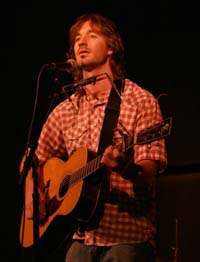
|
|
|
|
|
|
WC:
|
You
moved to Nashville. Can you describe
the music scene there? It seems like a
lot of great musicians are from the area, including Josh Rouse. How has Nashville influenced you?
|
|
|
|
|
GH:
|
I
don't know. I think I've been very
uninfluenced by Nashville just because I didn't move down there and jump into
the music scene. I moved down there to
work a job and stayed at home and wrote songs that were very detached from what
was going on in the environment around me at the at time. Plus, those singer/songwriters, that circle
of people were already established when I got there. I couldn't jump into that circle even if I wanted to. I was doing my own thing.
The
only way that it's impacted me is that somebody gave me some Ryan Adams records
a couple of years ago. That was probably
my first introduction to Nashville. Not
that he's a complete Nashville artist, but I think he has some roots
there. If he can write a song that's
called 'Tennessee Sucks,' I think I'm allowed to say that he's been in
Nashville at least a little while.
|
|
|
|
WC:
|
Did
you grow up in Ohio?
|
|
|
|
GH:
|
Yeah. In Springfield, between Columbus and Dayton,
but I always tell people that I'm from Cincinnati. It's easier and I lived there for three summers. It feels more like home than Springfield
does anyway.
|
|
|
|
WC:
|
Do
you do music full-time?
|
|
|
|
GH:
|
Yeah. I've only been doing that· I haven't had a job for a while because I
knew ahead of time what was going to happen when I started talking to people. As soon as I got the management deal at
Nettwerk that I have and I knew what their plans were with me, then I stopped
working. I was actually a bartender for
a while, but I got fired because I refused to drink on the job. It was a pretty weird way to get fired.
|
|
|
|
|
|
|
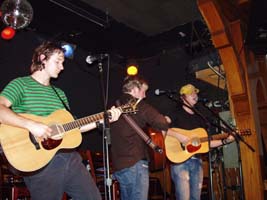
|
|
WC:
|
Describe
a typical day for you when you're actually at home.
|
|
|
|
GH:
|
I'm
not really at home much anymore since I'm on the road. I've been on the road for two or three weeks
a month. But when I am at home, I try
to write as much as I can and hang out with my friends and do other things to
keep me balanced like read and go to coffee shops and write. I do a bit of journaling and play golf every
now and then. It's relaxing. I'm actually the anti-golf golfer. I take my shoes off and walk around the
course.
|
|
|
|
|
WC:
|
How
many songs did you record for 'Upland' originally (first independent CD)?
|
|
|
|
GH:
|
I
recorded a demo right when I moved down to Nashville. I wanted to have some recordings, but it wasn't really for demo
purposes. I just got lucky with these
guys who asked if I wanted to record some songs. So, I did. They helped me
record them. There were six of
those. We call them the 'Never
Sessions.' Then, I was writing songs in
the summer and just kept going. I put
that CD out and did another record in the summer. I was on tour with a group called Over the Rhine and I was
opening up for them. Their tour got
canceled and we had to come home. So, I
made the record with the drummer and guitarist that were playing with them. It was kind of interesting how that worked
out.
|
|
|
|
WC:
|
How
did you decide which songs to put on the CD?
|
|
|
|
GH:
|
From
'Upland?' That was difficult because
there are a lot of songs on there that I hope people get to hear. I look back on it and think, "Man, that
should almost be on a debut CD instead of some of the other stuff." But, I think what it came down to was that
we took the songs that we knew should absolutely be on there; that people have
to hear them. They describe the artist
that I was at the time. So, we took
those four songs and put it together with a band record. We initially had nine band songs, but we
needed to make the record shorter, so I did. So, it was 13 songs and over an hour.
I cut two songs.
|
|
|
|
WC:
|
Were
you happy with the end product?
|
|
|
|
GH:
|
I
was so excited about it because I think it's been a long time coming to have a
compilation of stuff. I really feel
like it was the best stuff I had done.
The fact that it's out there for people to hear is great; especially
when you can do it in a round about way, without signing your life away get it
out there. And the fact that no one was
telling us what to do. We recorded
everything exactly how we wanted to. I
was spending my money from bartending to make it and the guys worked for free
and it got picked up, so it's a good deal.
It's a really good feeling.
|
|
|
|
WC:
|
There
are a lot of male singer/songwriters on the horizon and in the scene
today. In a sense, it's really good
because it shows that people are willing to accept that genre again because for
years they wouldn't. On the other hand,
there are a lot of comparisons. How do
you feel you're different from the John Mayer's of the world?
|
|
|
|
GH:
|
that's
great question. For whatever reason, I
don't feel a part of that movement. I
don't feel a part of the acoustic guitar, upper middle class white kid out
there writing songs. It's funny because
that's pretty much, at face value, what people think. I would like to think that what I'm doing has a little more to do
with the words on the paper and meaning, a little more rock and roll and a
little more edgy. I've considered, at
times, just stopping playing the acoustic guitar and taking an amp and electric
with me on the road. I want to force an
obvious separation between them or have my band out there with me. I think what will happen naturally is that
if you're out there making your music and you are unique, then you won't have
to do things on purpose to explain that your different. I hope that's what happens naturally when
people hear the record or come to a show.
I'm not trying to sing pop songs.
Not to slight John Mayer at all, but I just don't think that's what I
do, for better or worse.
|
|
|
|
WC:
|
Who
would you consider to be some of your influences in your songwriting and
playing styles?
|
|
|
|
GH:
|
I
think people like Tom Waits and even people like Tom Petty. If I left off Jeff Buckley, I'd feel
weird. I guess just people like
that. I respect artists like Beck and
Springstein. I feel funny making those
kind of comparisons because everyone is always ultra successful and famous and
that's not why I'm naming them. But, if
I name someone underground, you're not going to know who it is and the
comparison is lost. I find that I
identify with guys who are in bands just as much as I do... Jeff Tweedy (Wilco) would be someone that I
would definitely name. He's someone
who's influenced me just as much as the next guy. Woody Guthrie, Bob Dylan... no one who really plays pop music
unless U2 plays pop music.
|
|
|
|
WC:
|
They
do.
|
|
|
|
GH:
|
They
do, but it's still so rock and roll.
|
|
|
|
WC:
|
Yeah,
but pop music is just whatever is popular.
It doesn't have to be Britney Spears to be pop music.
|
|
|
|
GH:
|
It's
almost like people use that term "pop" hoping that the person sitting across
from you understands what you mean because it isn't always a negative
thing.
|
|
|
|
WC:
|
Right. But it has such a horrible connotation to
it. Now, you played 7 songs
tonight. Of the songs you generally
play, what are your favorites to play live?
|
|
|
|
GH:
|
'Waterfalls'
is my favorite new song to play since it's from the new record. I like that song. I like playing 'The Way I Was Made' when my voice feels
good. I really like playing songs with
the harmonica, like 'Judas.' I feel
that if the crowd is up to it, then I'll play those songs since (the crowd) is
listening and paying attention.
|
|
|
|
WC:
|
When
you've written a new song, at what point do you feel confident enough in it to
play it live?
|
|
|
|
GH:
|
Some
songs, I've written and played on the same day. That takes a little bit of extra effort for that to happen, so it
doesn't happen all the time, but I've definitely done that. It's very rare because it's not like you're
writing a new song every day. Well,
sometimes you are, but sometimes you're not writing at all. Sometimes you're writing a lot.
|
|
|
|
WC:
|
Are
you currently writing a lot?
|
|
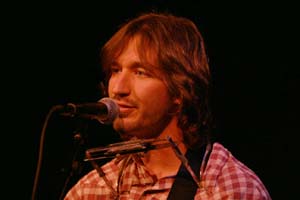
|
|
|
|
GH:
|
It's
hard for me to write on the road because I don't get a lot of time alone at
all. I'm either in the car and show up
to the venue, play a show, and go home.
I write mostly when I'm just by myself.
At home, I write a lot.
|
|
|
|
WC:
|
And
what comes first, the lyrics or the music?
|
|
|
|
|
GH:
|
They
either come at the same time or I'll get a guitar and just get a groove going
and get a basic progression going and write from there. It's pretty rare when the words come first.
|
|
|
|
WC:
|
What
are the types of things that inspire the lyrics?
|
|
|
|
GH:
|
I
think my songs tend to be about relationships and relationships vary. Whether it's a spiritual relationship with
God, which I think I've been talking about a lot, sometimes it's disguised as
other things, but I've been talking about that a lot. Or a relationship with alcohol, which I talk about in songs. Or a relationship with women, obviously that
happens. I say, "women" because I seem
to always date older women instead of dating girls my age. So, instead of saying "girls," I say,
"women."
|
|
|
|
WC:
|
Who
are some of the people you have worked with, maybe co-written (with) that you
are proud of?
|
|
|
|
GH:
|
I
haven't co-written any songs up to this point.
I've written them all. It's been
a very personal thing for me so far. I
think I'm just starting to get comfortable.
I'm kind of co-writing a song with one of my friends now. I'm enjoying that. I guess I don't venture into that area very often. I'm more comfortable in my own world, but it
will be good to get out of that comfort zone.
I think it's nice to write alone and get the job done that way.
|
|
|
|
WC:
|
You
have a new CD called 'Lost and Found.'
Where did the title come from?
|
|
|
|
GH:
|
I
think it comes from John Milton. I
wanted to do it because I read 'Paradise Lost' in college and I wrote a song
for that class instead of writing a term paper. The teacher let me do that.
But, Milton has the book 'Paradise Lost' and 'Paradise Regained.' It's always been a big theme for me, so I
guess I just named the CD after that idea.
|
|
|
|
WC:
|
What
music are you currently listening to?
|
|
|
|
GH:
|
I'm
listening to... I've got an iPod now, so I have all this great music. I'm listening to some Crosby, Stills, Nash
and Young, Emmy Lou Harris... some of the stuff is really weird, like I'm listening
to some hip-hop, like DJ Danger Mouse.
that's all I can think of right now.
|
|
|
|
WC:
|
Where
do you see yourself in five years?
|
|
|
|
GH:
|
I
don't know. I have no idea what's going
to happen. I could not even be here in
five years and I think that would be OK.
But, I feel like I have a lot of work to do. I feel like I have a lot to accomplish. I hope I'm playing for really, really big crowds with lots of
people and able to have my band there.
I really want to experience that and move people in an emotional
way. To me, it's the more people the
better. I'm not the type of person to
be like, "Once a club gets so big, I don't want to play anything bigger than
that." I'd rather be open to whatever.
|
|
|
|
|
|
|
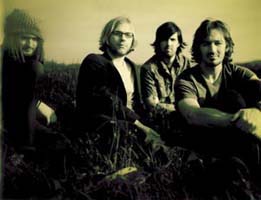
|
|
WC:
|
Would
you prefer to play solo acoustic shows or bring in the full band?
|
|
|
|
GH:
|
I
prefer the band. Definitely. It's nice to have the option to do both,
though. I feel really fortunate to get
dates and play the acoustic guitar.
It's so much simpler that way and it makes sense on paper better because
you're actually making money, or at least breaking even, instead of trying to
constantly trying to use tour support to have the band out in the beginning
stages.
|
|
|
|
|
WC:
|
What
do you consider to be your strengths and weaknesses as a musician?
|
|
|
|
GH:
|
I
think they kind of fall into the same category sometimes. For instance, sometimes I feel like if a
crowd is iffy on what they're hearing, sometimes I use my voice to draw them
in. It's like a power play in
hockey. I'll sing an octave above where
I was singing and get their attention that way. But also, if I happen to have a night where I'm not feeling as
healthy or my voice doesn't feel capable of going where it goes sometimes, then
that can be a weakness because it's not there.
But, I think my voice is a strength.
And the basic structure of the words and songwriting is a strength. I try to write so even if I don't perform a
song very well, it will still be good because the song is good. I try to write that way where it's not based
totally on my performance, but it's based on the song and whatever life it's
taken on.
|
|
|
|
WC:
|
What's
your favorite part of your job?
|
|
|
|
GH:
|
Just
doing what my job is. Recording songs,
coming out and playing for people. When
I'm doing that, I feel like I'm doing something that's 100% right. It doesn't ever feel hypocritical like many
other, or all other, aspects of life feel to me sometimes, because I'm unsure
of things, or I don't know what I'm supposed to be doing, or how I'm behaving. I'm always having questions about that. But, when I'm playing, I feel that it's
really what I'm supposed to be doing.
|
|
|
|
WC:
|
At
what point will you consider yourself a success? Or do you already?
|
|
|
|
GH:
|
I
think it's both. The fact that I'm
doing what I'm meaning to do and that I'm surviving is already a success. I think I'll consider myself a success when
what I'm doing helps other people more than it helps me. I want to get to a place where what I'm doing
is giving something to other people rather than being like, "I want to make
sure I can take this to a certain level so I can feel satisfied with
myself." that's not really what it's
about. Well, it's also about that, but
I want it to be about other people as well.
I don't want to sound cliche, but it's true. If I search deep down myself, it's not about me.
|
|
|
|
WC:
|
So,
if you weren't a musician, what would you be doing with your life?
|
|
|
|
GH:
|
that's
a good question. I don't know. I'm not sure. I feel like I could do lots of things and there are many jobs I
could have. And, I could even feel
partially satisfied in them, but because I'm doing what I think I'm supposed to
be doing, I don't really think about it.
I don't really consider other options.
|
|
|
|
WC:
|
What
song do you wish you had written?
|
|
|
|
GH:
|
All
the stuff I love and listen to. But, it
doesn't matter if I wrote it or not because it's out there and that's all that
really matters. But, there's stuff that
I completely admire and even if I don't wish I had written the song, I wish
that I could write something that meaningful.
There's a song on Bob Dylan's 'Wrecking Ball' called 'Every Grain of
Sand,' and I think it's above and beyond what I've heard anyone write. Ever.
I think it's incredible. The
imagery and the way it's put together·it's just one of the most amazing songs
ever.
|
|
|
|
WC:
|
What
are some of your favorite venues to play?
|
|
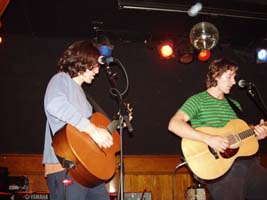
|
|
|
|
GH:
|
that's
a good question. I probably haven't
played enough yet to answer that question.
Schuba's is great. I like
playing big places because I like having a lot of space to work with and a lot
of volume to work with and it can get more dynamic when it's louder because you
have the ability to be really loud or take all that energy and bring it down to
an intimate level. I would prefer to
play in bigger places.
|
|
|
|
|
WC:
|
We
have come to my favorite part of the interview, 7 questions:
|
|
|
|
|
|

|
|
|
|
|
What's the worst job
you've ever had? I
hate working in the food industry. The
worst job I ever had was probably working at Uno's in Cincinnati because if you
weren't a good waiter or hadn't been there for awhile, it was impossible to
make tips because people just didn't like to tip there, first of all. The waiters that had been there for a while
liked to take all the good tables. So,
I had to resort to taking my guitar and going down to the village and playing
for tips because I wasn't making any money at that job. That was a bad job. I worked at Legends Gifts in Nashville when
I first moved to Tennessee, selling that cheap disposable souvenir stuff to
tourists and working until 1:30 in the morning and not being able to see my
friends at night. That was a real
drag. That was almost more of a bummer
because the time factor really bothers me.
I don't like to waste my time and I think time should be valuable. Ack!
I hated that job!
|
|
|
|
|
|
What's your favorite
movie or lyric quote? that's
an impossible question to answer.
|
|
|
|
|
|
WC:
|
Then
what's one of your favorites? If you
can't pick the ultimate, just pick one of them. |
|
|
|
GH:
|
OK. A line from a Woody Guthrie song.
'The smell of your hair I know is still there, if most
of our leaves are blown/Our words still ring in the brush and the trees where
singing seeds are sown.' that's just part of the song. It goes into all these verses.
that's one of my favorite songs. It's called 'Remember the Mountain
Bed.' I like that image of just being
able to smell something and have it take you back to this place. |
|
|
|
|
|
|
Who would you want to
star in the movie of your life? Oh man, I don't know. I guess I would want it to be someone who knew me really well
personally, so maybe one of my best friends, Rusty Ralston or one of my other
best friends, Donnie Mortimer.
|
|
|
|
|
|
What's your favorite TV
theme song? that's
another good question. I'm trying to
think of something in the '80s that comes on late at night, like Miami Vice or
Magnum P.I. Probably one of those, even
though I can't remember the songs.
Anything that reminds me of being a child of the '80s would probably be
a good one. I was watching U2 on MTV
winning video awards even though I was pissed off at them because they were
beating Michael Jackson. I was like, "I
hate this band that's beating Michael Jackson and winning these awards for 'Sunday,
Bloody Sunday!' I want the Thriller album!" Of course, now, that's totally
my band.
|
|
|
|
|
|
If you were a
superhero, what would your name be?
What would it be?
I don't know. If I were a super
hero, it would probably have to be
something with House, wouldn't it? It
would probably be something like Griffin Unstoppable House. A force to be reckoned with.
|
|
|
|
|
|
What do you want to be
when you grow up? I want to be a patriotic citizen of my country. I want to be someone that God is proud
of. I think I want to be like David or
someone in the Bible that God blesses because He thinks they're trying to do
the right thing. So far, I do nothing
but screw up and think about myself and do selfish things. But, I think I'm
starting to grow up and realize that every human life is equal. So, I'm no more or less great than anyone
else.
|
|
|
|
|
|
Finally, why are there
so many songs about rainbows?
I don't know, man... Oh! I do know this! You know
that in Genesis, God says that ... I'm
getting really religious, aren't I? In
Genesis, it says that God sent the rainbow after the flood to remind Noah and
the people on earth that he would never send another flood to wipe out the
human race again. He made a covenant
with them and the covenant was just an agreement that, "I know you guys are
messed up, but I'm not going to kill you off again." Maybe that's what's magical about rainbows because people know
that they have a chance to live.
|
|
|
|
|
|
|
|
WC:
|
Great! Thanks a lot, Griffin.
|
|
|
|
GH:
|
Thank
you! That was great!
|
|
|
|
To find out more information about Griffin
House, visit his website at www.griffinhousemusic.com.
|
|
|
|